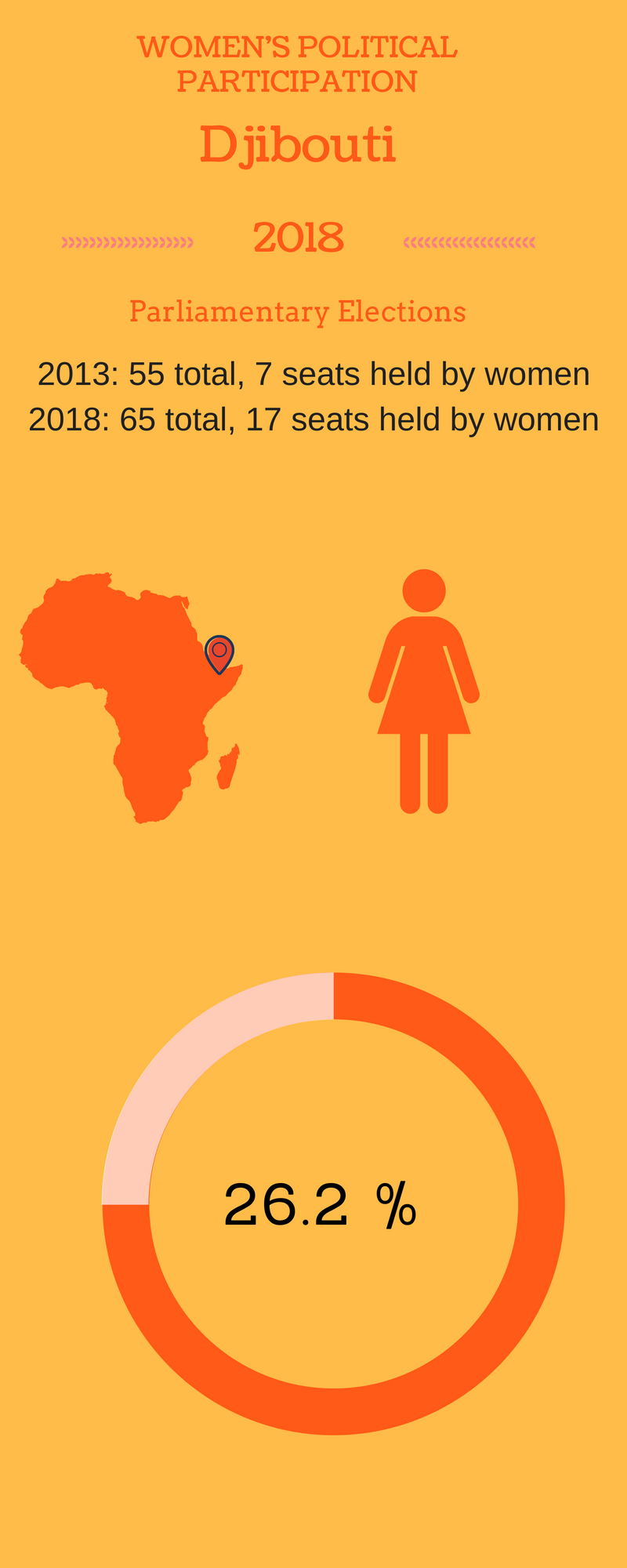Parliamentary elections were held in Djibouti on 23 February 2018 and resulted in the victory of President Ismael Omar Guelleh’s ruling party. The party Union for the Presidential Majority won almost 90 percent of all seats. As shown by government figures, remaining seats went to the opposition Union for Democracy and Justice–Djibouti Party for Development (UDJ–PDD), which won seven seats in Djibouti city electoral district.
The voting system was recently changed - after 2013 winner-takes-all party block vote was abandoned and replaced by close list system. According to this method, 80 percent of all seats in each constituency are awarded to the party that received the majority of the votes and allocate remaining seats to other parties receiving over 10% of the vote using the D'Hondt method. If no other party receives more than 10% of the vote, all the seats in a constituency are awarded to the party receiving the most votes.
The allocation of the necessary women quota was also reformed. The law now stipulates that 25 percent of all seats must be assigned to women, which is more than a double increase from previous ten percent. However, as stated by Mahyoub, this limit was nearly met as 15 women won parliamentary seats, 14 of them from the UMP, equal 23.08 percent of all seats.
Women’s Political Participation
Various forms of discriminations in custom, law, and religion are still influencing the life of Djiboutian women. Treaties, such as Convention on the Political Rights of Women in 1953; the International Covenant on Economic, Social and Cultural Rights (1966) and the International Covenant on Civil and Political Rights (1966) (both ratified in 2002) have played an important role to women’s empowerment.
Djibouti has a national policy for the promotion of women, children and vulnerable people and has set up The Ministry for the Advancement of Women, Family Welfare and Social Affairs (MPF) is responsible for promoting the rights of Djiboutian women. In 2010 the MPF started developing a National Gender Policy, which is still on-going and plays a crucial role in implementing the National Strategy for Integration of Women in Development. Constitutional changes brought by the ratification of CEDAW in 1998 and The Maputo Protocol in 2005 can be seen in the social and professional lives of women, as their political participation was raised up to 12,7% in the last 19 years.
In Djibouti, the minimum age for marriage is 18 but child marriage still persists. As seen in the 2006 Multiple Indicator Cluster Survey findings, 5 percent of young women aged 20-24 in urban areas and 13 percent of young women in rural areas were married before the age of 18. Gender-based violence is not protected by law. Unlike rape, current law does not directly prohibit domestic violence, although it does prohibit “torture and barbaric acts” against a spouse. Female genital mutilation/cutting (FGM/C) is still very common. Although the government has taken a number of actions in order to combat the practice, the prevalence of FGM/C is 93 percent among women age 15-49 according to EDIM 2006 findings. In urban areas, 93 percent of women are cut, while in rural areas 96 percent are cut.
Women first gained the right to vote in 1946 but it was not until 1986 that they received the right to stand for election. A woman was elected to parliament for the first time in the year 2003. Prior to 1999, women’s political participation was almost non-existent, with no women elected to political posts: 0,0% of women participating in single and lower houses of parliament in 1995. Nonetheless, with the introduction of major legislative reforms , changes in the structures of decision-making are now reflected in the number of seats held by women in national parliament, which in 2012 reached 12,7%.
In 2018 elections, around 25 percent of 112 candidates were women . The only main female representative in the election was Hasna Moumin Bahdon, leader of People's Social Democratic Party, which received no adequate support and didn't win any seats in the last election. Currently, 17 out of 65 seats of National Assembly are held by women and this translates to 26,2% of all seats. In 2013, only seven women were elected and they were all from the Union for the Presidential Majority (UMP). Five years prior to that (in 2008), nine women were elected, representing 13.85% of all seats.
Conclusion
The introduction of new legal frameworks and policies have positively impacted women in decision-making in Djibouti. Even though the numbers may still not be considered as high, women’s presence in the public sphere is growing at all levels.

